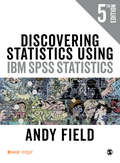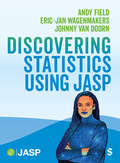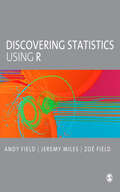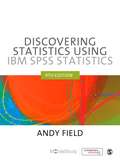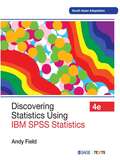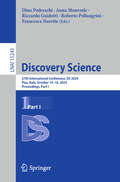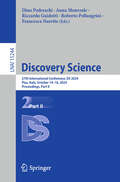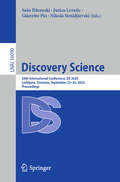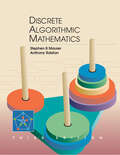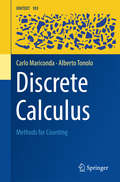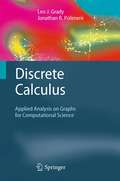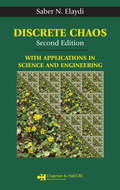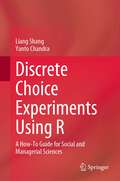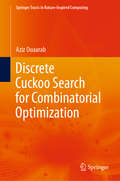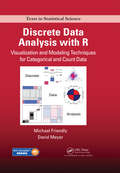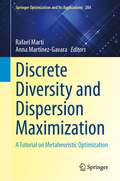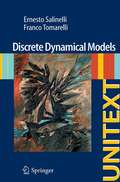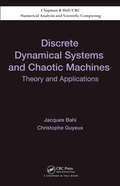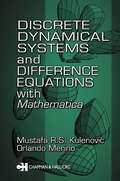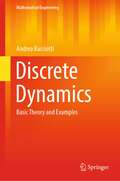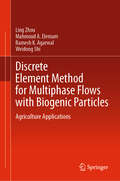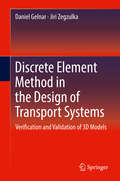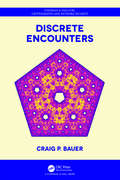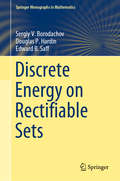- Table View
- List View
Discovering Statistics Using IBM SPSS Statistics
by Professor Andy FieldWith an exciting new look, new characters to meet, and its unique combination of humour and step-by-step instruction, this award-winning book is the statistics lifesaver for everyone. From initial theory through to regression, factor analysis and multilevel modelling, Andy Field animates statistics and SPSS software with his famously bizarre examples and activities. What’s brand new: A radical new design with original illustrations and even more colour A maths diagnostic tool to help students establish what areas they need to revise and improve on. A revamped digital resource that uses video, case studies, datasets and more to help students negotiate project work, master data management techniques, and apply key writing and employability skills New sections on replication, open science and Bayesian thinking Now fully up to date with latest versions of IBM SPSS Statistics©. Please note that ISBN: 9781526445780 comprises the paperback edition of the Fifth Edition and the student version of IBM SPSS Statistics. More information on this version of the software's features can be found here.
Discovering Statistics Using JASP
by Andy Field Johnny van Doorn Eric-Jan WagenmakersUnlock the world of statistics with Discovering Statistics using JASP, a comprehensive guide that brings the power of JASP software into the classroom. Building on the legacy of the acclaimed DSUSS series, this book distils complex statistical concepts into engaging, step-by-step content designed for undergraduate courses. Students will gain practical skills in data analysis without needing to learn coding, thanks to JASP’s intuitive point-and-click interface. This first edition also offers: Global relevance: Features international examples and case studies, making it ideal for diverse classroom settings. A student-focused approach: An abridged version tailored to undergraduate needs, with accessible summaries and practical solutions. Cutting-edge tools: Leverages free JASP software, supported by world-renowned experts and the University of Amsterdam. Alignment with open science: Encourages reproducibility and transparency in research practices. Perfect for undergraduates and lecturers alike, this book is the ultimate resource for mastering statistics with JASP. The wealth of online resources can be easily integrated into your institution′s virtual learning environment or learning management system. This allows you to customise and curate content for use in module preparation, delivery and assessment.
Discovering Statistics Using JASP
by Andy Field Johnny van Doorn Eric-Jan WagenmakersUnlock the world of statistics with Discovering Statistics using JASP, a comprehensive guide that brings the power of JASP software into the classroom. Building on the legacy of the acclaimed DSUSS series, this book distils complex statistical concepts into engaging, step-by-step content designed for undergraduate courses. Students will gain practical skills in data analysis without needing to learn coding, thanks to JASP’s intuitive point-and-click interface. This first edition also offers: Global relevance: Features international examples and case studies, making it ideal for diverse classroom settings. A student-focused approach: An abridged version tailored to undergraduate needs, with accessible summaries and practical solutions. Cutting-edge tools: Leverages free JASP software, supported by world-renowned experts and the University of Amsterdam. Alignment with open science: Encourages reproducibility and transparency in research practices. Perfect for undergraduates and lecturers alike, this book is the ultimate resource for mastering statistics with JASP. The wealth of online resources can be easily integrated into your institution′s virtual learning environment or learning management system. This allows you to customise and curate content for use in module preparation, delivery and assessment.
Discovering Statistics Using R
by Andy Field Jeremy Miles Zoe FieldKeeping the uniquely humorous and self-deprecating style that has made students across the world fall in love with Andy Field′s books, Discovering Statistics Using R takes students on a journey of statistical discovery using R, a free, flexible and dynamically changing software tool for data analysis that is becoming increasingly popular across the social and behavioural sciences throughout the world. The journey begins by explaining basic statistical and research concepts before a guided tour of the R software environment. Next you discover the importance of exploring and graphing data, before moving onto statistical tests that are the foundations of the rest of the book (for example correlation and regression). You will then stride confidently into intermediate level analyses such as ANOVA, before ending your journey with advanced techniques such as MANOVA and multilevel models. Although there is enough theory to help you gain the necessary conceptual understanding of what you′re doing, the emphasis is on applying what you learn to playful and real-world examples that should make the experience more fun than you might expect. Like its sister textbooks, Discovering Statistics Using R is written in an irreverent style and follows the same ground-breaking structure and pedagogical approach. The core material is augmented by a cast of characters to help the reader on their way, together with hundreds of examples, self-assessment tests to consolidate knowledge, and additional website material for those wanting to learn more. Given this book′s accessibility, fun spirit, and use of bizarre real-world research it should be essential for anyone wanting to learn about statistics using the freely-available R software.
Discovering Statistics using IBM SPSS Statistics
by Andy FieldUnrivalled in the way it makes the teaching of statistics compelling and accessible to even the most anxious of students, the only statistics textbook you and your students will ever need just got better!<P><P> Andy Field's bestselling Discovering Statistics Using SPSS 4th Edition, already an immensely comprehensive textbook - taking students from first principles to advanced statistical concepts, and all the while grounding knowledge through the use of SPSS - now focuses on providing essential updates, better accessibility to its key features, more instructor resources and broader reach to new student groups - with powerful new digital developments on the textbook's companion website.<P> New to the 4th Edition<P> - New WebAssign® facility. If you adopt this for use on your course it will allow you to produce and manage assignments online with your students and includes a grading facility to monitor students' progress. Students can practise questions over and over and be provided with instant feedback and links to the accompanying Ebook where correct solutions can be found<P> - The mobile study facility encourages students equipped with smartphones and tablets to access revision material such as Cramming Sam's Study tips helping them to study when it suits them. QR codes in the textbook provide instant access<P> - Education and Sport Sciences instructor support materials with enhanced ones for Psychology, Business and Management and the Health sciences make the book even more relevant to a wider range of subjects across the social sciences and where statistics is taught to a cross-disciplinary audience.<P> Major Updates to the 4th Edition<P> - Fully compatible with recent SPSS releases up to and including version 21<P> - Exciting new characters. Statistical cult leader Oditi provides students with access to video clips to help further understanding of statistical/SPSS concepts, while Confusious helps students to make better sense of statistical terms<P> - An enhanced Companion Website offers plenty of lecturer and student material to use in conjunction with the textbook. These include PowerPoints and Testbanks for lecturers as well as answers to the Smart Alex tasks at the end of the each chapter; datafiles for testing problems in SPSS; flashcards of key concepts; self-assessment multiple-choice questions; and online videos of key statistical and SPSS procedures discussed in the textbook for students.
Discovering Statistics using IBM SPSS Statistics
by Andy FieldThe only statistics textbook you'll ever need just got even better! Students and practitioners of social science often look at mathematics and its allies with suspicion. This book attempts at moderating such a feeling in an interactive and humorous way. The time-tested approach and content serve students of undergraduate and postgraduate levels. With the help of real research examples, the book will take students as well as teachers on a wonderful journey covering both basic principles and advanced concepts and applications of statistics. This book can become your best friend if you want to understand and use statistics to conduct data analysis in the best possible way. Grab it and leave those anxious moments of overload of mind-boggling data behind! Key Features: The 4th edition comes with • A balanced blend of theory and practice of statistics • Updated versions of IBM SPSS Statistics (including version 21) • SPSS tips and tricks and self-test questions • Engaging diagrammatic summary of key steps learnt in each chapter • Bootstrapping
Discovery Science: 27th International Conference, DS 2024, Pisa, Italy, October 14–16, 2024, Proceedings, Part I (Lecture Notes in Computer Science #15243)
by Dino Pedreschi Riccardo Guidotti Anna Monreale Roberto Pellungrini Francesca NarettoThe two-volume set LNAI 15243 + 15244 constitutes the proceedings of the 27th International Conference on Discovery Science, DS 2024, which took place in Pisa, Italy, during October 14-16, 2024. The 53 full papers presented in the proceedings were carefully reviewed and selected from 121 submissions. They were organized in topical sections as follows: Part I: LLM, Text Analytics, and Ethical Aspects of AI; Natural Language Processing, Sequential Data and Science Discovery; Data-Driven Science Discovery Methodologies; Graph Neural Network, Graph Theory, Unsupervised Learning and Regression; Part II: Tree-Based Models and Causal Discovery; Security and Anomaly Detection; Computer Vision and Explainable AI; Classification Models; SoBigData++: City for Citizens and Explainable AI; SoBigData++: Societal Debates and Misinformation Analysis.
Discovery Science: 27th International Conference, DS 2024, Pisa, Italy, October 14–16, 2024, Proceedings, Part II (Lecture Notes in Computer Science #15244)
by Dino Pedreschi Riccardo Guidotti Anna Monreale Roberto Pellungrini Francesca NarettoThe two-volume set LNAI 15243 + 15244 constitutes the proceedings of the 27th International Conference on Discovery Science, DS 2024, which took place in Pisa, Italy, during October 14-16, 2024. The 53 full papers presented in the proceedings were carefully reviewed and selected from 121 submissions. They were organized in topical sections as follows: Part I: LLM, Text Analytics, and Ethical Aspects of AI; Natural Language Processing, Sequential Data and Science Discovery; Data-Driven Science Discovery Methodologies; Graph Neural Network, Graph Theory, Unsupervised Learning and Regression; Part II: Tree-Based Models and Causal Discovery; Security and Anomaly Detection; Computer Vision and Explainable AI; Classification Models; SoBigData++: City for Citizens and Explainable AI; SoBigData++: Societal Debates and Misinformation Analysis.
Discovery Science: 28th International Conference, DS 2025, Ljubljana, Slovenia, September 23–25, 2025, Proceedings (Lecture Notes in Computer Science #16090)
by Sašo Džeroski Jurica Levatić Gianvito Pio Nikola SimidjievskiThe DS 2025 constitutes the proceedings of the 28th International Conference on Discovery Science, DS 2025, which took place in Ljubljana, Slovenia, during September 22–26, 2025. The 38 full papers presented in this volume were carefully reviewed and selected from 86 submissions. They were organized in topical sections as follows: the development and analysis of methods for discovering scientific knowledge, coming from machine learning, data mining, and intelligent data analysis, and big data analytics, as well as their application in various domains.
Discrete Algorithmic Mathematics
by Anthony Ralston Stephen B. MaurerThoroughly revised for a one-semester course, this well-known and highly regarded book is an outstanding text for undergraduate discrete mathematics. It has been updated with new or extended discussions of order notation, generating functions, chaos, aspects of statistics, and computational biology. Written in a lively, clear style, the book is unique in its emphasis on algorithmics and the inductive and recursive paradigms as central mathematical themes. It includes a broad variety of applications, not just to mathematics and computer science, but to natural and social science as well.
Discrete Calculus
by Carlo Mariconda Alberto TonoloThis book provides an introduction to combinatorics, finite calculus, formal series, recurrences, and approximations of sums. Readers will find not only coverage of the basic elements of the subjects but also deep insights into a range of less common topics rarely considered within a single book, such as counting with occupancy constraints, a clear distinction between algebraic and analytical properties of formal power series, an introduction to discrete dynamical systems with a thorough description of Sarkovskii's theorem, symbolic calculus, and a complete description of the Euler-Maclaurin formulas and their applications. Although several books touch on one or more of these aspects, precious few cover all of them. The authors, both pure mathematicians, have attempted to develop methods that will allow the student to formulate a given problem in a precise mathematical framework. The aim is to equip readers with a sound strategy for classifying and solving problems by pursuing a mathematically rigorous yet user-friendly approach. This is particularly useful in combinatorics, a field where, all too often, exercises are solved by means of ad hoc tricks. The book contains more than 400 examples and about 300 problems, and the reader will be able to find the proof of every result. To further assist students and teachers, important matters and comments are highlighted, and parts that can be omitted, at least during a first and perhaps second reading, are identified.
Discrete Calculus
by Leo J. Grady Jonathan R. PolimeniThe field of discrete calculus, also known as "discrete exterior calculus", focuses on finding a proper set of definitions and differential operators that make it possible to operate the machinery of multivariate calculus on a finite, discrete space. In contrast to traditional goals of finding an accurate discretization of conventional multivariate calculus, discrete calculus establishes a separate, equivalent calculus that operates purely in the discrete space without any reference to an underlying continuous process. This unique text brings together into a single framework current research in the three areas of discrete calculus, complex networks, and algorithmic content extraction. Although there have been a few intersections in the literature between these disciplines, they have developed largely independently of one another, yet researchers working in any one of these three areas can strongly benefit from the tools and techniques being used in the others. Many example applications from several fields of computational science are provided to demonstrate the usefulness of this framework to a broad range of problems. Readers are assumed to be familiar with the basics of vector calculus, graph theory, and linear algebra. Topics and features: presents a thorough review of discrete calculus, with a focus on key concepts required for successful application; unifies many standard image processing algorithms into a common framework for viewing a wide variety of standard algorithms in filtering, clustering, and manifold learning that may be applied to processing data associated with a graph or network; explains how discrete calculus provides a natural definition of "low-frequency" on a graph, which then yields filtering and denoising algorithms; discusses how filtering algorithms can give rise to clustering algorithms, which can be used to develop manifold learning and data discovery methods; examines ranking algorithms, as well as algorithms for analyzing the structure of a network. Graduate students and researchers interested in discrete calculus, complex networks, image processing and computer graphics will find this text/reference a clear introduction to the foundations of discrete calculus as well as a useful guide to have readily available for their work. Dr. Leo J. Grady is a Senior Research Scientist with Siemens Corporate Research in Princeton, New Jersey, USA. Dr. Jonathan R. Polimeni is a Research Fellow at the Massachusetts General Hospital in Boston, Massachusetts, USA, and Instructor in Radiology at Harvard Medical School, Boston, Massachusetts, USA.
Discrete Chaos: With Applications in Science and Engineering
by Saber N. ElaydiWhile maintaining the lucidity of the first edition, Discrete Chaos, Second Edition: With Applications in Science and Engineering now includes many recent results on global stability, bifurcation, chaos, and fractals. The first five chapters provide the most comprehensive material on discrete dynamical systems, including trace-determinant stability, bifurcation analysis, and the detailed analysis of the center manifold theory. This edition also covers L-systems and the periodic structure of the bulbs in the Mandelbrot set as well as new applications in biology, chemistry, and physics. The principal improvements to this book are the additions of PHASER software on an accompanying downloadable resources and the Maple™ and Mathematica® code available for download online.Incorporating numerous new topics and technology not found in similar texts, Discrete Chaos, Second Edition presents a thorough, up-to-date treatment of the theory and applications of discrete dynamical systems.
Discrete Choice Experiments Using R: A How-To Guide for Social and Managerial Sciences
by Yanto Chandra Liang ShangThis book delivers a user guide reference for researchers seeking to build their capabilities in conducting discrete choice experiment (DCE). The book is born out of the observation of the growing popularity – but lack of understanding – of the techniques to investigate preferences. It acknowledges that these broader decision-making processes are often difficult, or sometimes, impossible to study using conventional methods. While DCE is more mature in certain fields, it is relatively new in disciplines within social and managerial sciences. This text addresses these gaps as the first ‘how-to’ handbook that discusses the design and application of DCE methodology using R for social and managerial science research. Whereas existing books on DCE are either research monographs or largely focused on technical aspects, this book offers a step-by-step application of DCE in R, underpinned by a theoretical discussion on the strengths and weaknesses of the DCE approach, with supporting examples of best practices. Relevant to a broad spectrum of emerging and established researchers who are interested in experimental research techniques, particularly those that pertain to the measurements of preferences and decision-making, it is also useful to policymakers, government officials, and NGOs working in social scientific spaces.
Discrete Cuckoo Search for Combinatorial Optimization (Springer Tracts in Nature-Inspired Computing)
by Aziz OuaarabThis book provides a literature review of techniques used to pass from continuous to combinatorial space, before discussing a detailed example with individual steps of how cuckoo search (CS) can be adapted to solve combinatorial optimization problems. It demonstrates the application of CS to three different problems and describes their source code. The content is divided into five chapters, the first of which provides a technical description, together with examples of combinatorial search spaces. The second chapter summarizes a diverse range of methods used to solve combinatorial optimization problems. In turn, the third chapter presents a description of CS, its formulation and characteristics. In the fourth chapter, the application of discrete cuckoo search (DCS) to solve three POCs (the traveling salesman problem, quadratic assignment problem and job shop scheduling problem) is explained, focusing mainly on a reinterpretation of the terminology used in CS and its source of inspiration. In closing, the fifth chapter discusses random-key cuckoo search (RKCS) using random keys to represent positions found by cuckoo search in the TSP and QAP solution space.
Discrete Data Analysis with R: Visualization and Modeling Techniques for Categorical and Count Data (Chapman And Hall/crc Texts In Statistical Science Ser. #120)
by Michael Friendly David MeyerAn Applied Treatment of Modern Graphical Methods for Analyzing Categorical DataDiscrete Data Analysis with R: Visualization and Modeling Techniques for Categorical and Count Data presents an applied treatment of modern methods for the analysis of categorical data, both discrete response data and frequency data. It explains how to use graphical meth
Discrete Diversity and Dispersion Maximization: A Tutorial on Metaheuristic Optimization (Springer Optimization and Its Applications #204)
by Rafael Martí Anna Martínez-GavaraThis book demonstrates the metaheuristic methodologies that apply to maximum diversity problems to solve them. Maximum diversity problems arise in many practical settings from facility location to social network analysis and constitute an important class of NP-hard problems in combinatorial optimization. In fact, this volume presents a “missing link” in the combinatorial optimization-related literature. In providing the basic principles and fundamental ideas of the most successful methodologies for discrete optimization, this book allows readers to create their own applications for other discrete optimization problems. Additionally, the book is designed to be useful and accessible to researchers and practitioners in management science, industrial engineering, economics, and computer science, while also extending value to non-experts in combinatorial optimization. Owed to the tutorials presented in each chapter, this book may be used in a master course, a doctoral seminar, or as supplementary to a primary text in upper undergraduate courses.The chapters are divided into three main sections. The first section describes a metaheuristic methodology in a tutorial style, offering generic descriptions that, when applied, create an implementation of the methodology for any optimization problem. The second section presents the customization of the methodology to a given diversity problem, showing how to go from theory to application in creating a heuristic. The final part of the chapters is devoted to experimentation, describing the results obtained with the heuristic when solving the diversity problem. Experiments in the book target the so-called MDPLIB set of instances as a benchmark to evaluate the performance of the methods.
Discrete Dynamical Models
by Ernesto Salinelli Franco TomarelliThis book provides an introduction to the analysis of discrete dynamical systems. The content is presented by an unitary approach that blends the perspective of mathematical modeling together with the ones of several discipline as Mathematical Analysis, Linear Algebra, Numerical Analysis, Systems Theory and Probability. After a preliminary discussion of several models, the main tools for the study of linear and non-linear scalar dynamical systems are presented, paying particular attention to the stability analysis. Linear difference equations are studied in detail and an elementary introduction of Z and Discrete Fourier Transform is presented. A whole chapter is devoted to the study of bifurcations and chaotic dynamics. One-step vector-valued dynamical systems are the subject of three chapters, where the reader can find the applications to positive systems, Markov chains, networks and search engines. The book is addressed mainly to students in Mathematics, Engineering, Physics, Chemistry, Biology and Economics. The exposition is self-contained: some appendices present prerequisites, algorithms and suggestions for computer simulations. The analysis of several examples is enriched by the proposition of many related exercises of increasing difficulty; in the last chapter the detailed solution is given for most of them.
Discrete Dynamical Systems and Chaotic Machines: Theory and Applications (Chapman & Hall/CRC Numerical Analysis and Scientific Computing Series #20)
by Christophe Guyeux Jacques BahiUntil the authors' recent research, the practical implementation of the mathematical theory of chaos on finite machines raised several issues. This self-contained book shows how to make finite machines, such as computers, neural networks, and wireless sensor networks, work chaotically as defined in a rigorous mathematical framework. Taking into account that these machines must interact in the real world, the authors share their research results on the behaviors of discrete dynamical systems and their use in computer science.
Discrete Dynamical Systems and Difference Equations with Mathematica
by Mustafa R.S. Kulenovic Orlando MerinoFollowing the work of Yorke and Li in 1975, the theory of discrete dynamical systems and difference equations developed rapidly. The applications of difference equations also grew rapidly, especially with the introduction of graphical-interface software that can plot trajectories, calculate Lyapunov exponents, plot bifurcation diagrams, and find ba
Discrete Dynamics: Basic Theory and Examples (Mathematical Engineering)
by Andrea BacciottiThis book offers a complete and detailed introduction to the theory of discrete dynamical systems, with special attention to stability of fixed points and periodic orbits. It provides a solid mathematical background and the essential basic knowledge for further developments such as, for instance, deterministic chaos theory, for which many other references are available (but sometimes, without an exhaustive presentation of preliminary notions). Readers will find a discussion of topics sometimes neglected in the research literature, such as a comparison between different predictions achievable by the discrete time model and the continuous time model of the same application. Another novel aspect of this book is an accurate analysis of the way a fixed point may lose stability, introducing and comparing several notions of instability: simple instability, repulsivity, and complete instability. To help the reader and to show the flexibility and potentiality of the discrete approach to dynamics, many examples, numerical simulations, and figures have been included. The book is used as a reference material for courses at a doctoral or upper undergraduate level in mathematics and theoretical engineering.
Discrete Element Method for Multiphase Flows with Biogenic Particles: Agriculture Applications
by Ling Zhou Ramesh K. Agarwal Weidong Shi Mahmoud A. ElemamThis book presents the advanced theory and application of the combined Computational Fluid Dynamics – Discrete Element Method (CFD-DEM) to multiphase flow simulations of the gas and bio-particulate matter of non-uniformly shaped biomass. It explores how DEM can simulate the complex behaviour of biomass particles, such as their packing in the multiphase flows that occurs in the agricultural product processing industries. It offers an overview of aerodynamic systems, such as cyclone separators, used in the agricultural processing industry. A detailed description of DEM modeling, including the particle-particle, particle-boundary, and particle-fluid interactions in the context of biomass particles of varying sizes and shapes, is provided. Coverage includes the critical application of CFD-DEM simulation technology in designing and optimizing grain handling and processing equipment and the application of extended DEM to other granular flows of complex particles like sand, powders, and dust from mines where clumping and agglomeration occur. The application of DEM in modeling and simulation of complex multiphase systems can help improve productivity, reduce costs, and increase efficiency in the agricultural industry.
Discrete Element Method in the Design of Transport Systems: Verification and Validation of 3D Models
by Daniel Gelnar Jiri ZegzulkaThis book deals with the design and optimization of the bucket elevator using the discrete element method (DEM). It describes the underlying scientific basis for the design of transport equipment using computer simulations and is focused on issues relevant to the industrial sector, mechanical engineering; and the transport, treatment, measurement, and storage of bulk materials. It presents solutions for mitigating bulk material supply chain interruptions due to process malfunctions and failures, utilizing research on monitoring and evaluating of the dynamic processes of particulate matter.The aim of the book is to help readers new to the field with the design of innovative devices. Imparting practical information aimed at saving time and money in project design, the book is ideal for engineers, designers, and researchers concerned with all aspects of bulk materials.Introduces and explains fully the Discrete Element Method using measured values as inputs for the method;Shows whether calculated simulations and real measured values models can be used for design;Illustrates how to validate, calibrate, and optimize the dynamic processes of bulk elevators;Explains how to test transport and storage equipment before it is produced using dynamic simulation of material flow on transport lines, saving time and money.
Discrete Encounters (Chapman & Hall/CRC Cryptography and Network Security Series)
by Craig BauerEschewing the standard dry and static writing style of traditional textbooks, Discrete Explorations provides a refreshing approach to discrete mathematics. The author combines traditional course topics with popular culture, applications, and various historical examples. This book focuses on the historical development of the subject and provides details on the people behind mathematics and their motivations, which will deepen readers’ appreciation of mathematics. With its unique style, the book covers many of the same topics found in other texts but done in an alternative, entertaining style that better captures readers’ attention. Defining discrete mathematics, the author also covers many different topics. These include combinatorics, fractals, permutations, difference equations, graph theory, trees and financial mathematics. Not only will readers gain a greater impression of mathematics, but they’ll be encouraged to further explore the subject. Highlights: Features fascinating historical references to motivate readers Text includes numerous pop culture references throughout to provide a more engaging reading experience Its unique topic structure presents a fresh approach The text’s narrative style reads more like a popular book instead of a dry textbook Covers many topics from combinatorics, as well as discrete mathematics
Discrete Energy on Rectifiable Sets (Springer Monographs in Mathematics)
by Edward B. Saff Sergiy V. Borodachov Douglas P. HardinThis book aims to provide an introduction to the broad and dynamic subject of discrete energy problems and point configurations. Written by leading authorities on the topic, this treatise is designed with the graduate student and further explorers in mind. The presentation includes a chapter of preliminaries and an extensive Appendix that augments a course in Real Analysis and makes the text self-contained. Along with numerous attractive full-color images, the exposition conveys the beauty of the subject and its connection to several branches of mathematics, computational methods, and physical/biological applications. This work is destined to be a valuable research resource for such topics as packing and covering problems, generalizations of the famous Thomson Problem, and classical potential theory in Rd. It features three chapters dealing with point distributions on the sphere, including an extensive treatment of Delsarte–Yudin–Levenshtein linear programming methods for lower bounding energy, a thorough treatment of Cohn–Kumar universality, and a comparison of 'popular methods' for uniformly distributing points on the two-dimensional sphere. Some unique features of the work are its treatment of Gauss-type kernels for periodic energy problems, its asymptotic analysis of minimizing point configurations for non-integrable Riesz potentials (the so-called Poppy-seed bagel theorems), its applications to the generation of non-structured grids of prescribed densities, and its closing chapter on optimal discrete measures for Chebyshev (polarization) problems.
